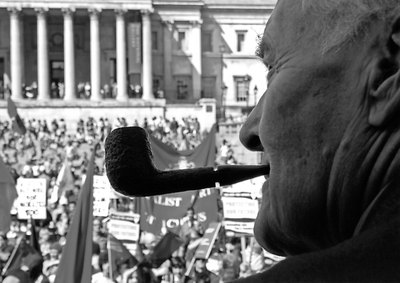Jad Adams, Tony Benn’s biographer who knew him well for the last 25 years of his life, said:
‘Tony Benn was a public figure for more than 60 years, only the Queen has a longer record.
‘He deserves respect for the sheer endurance of his chivalrous, witty combat in the service of his beliefs. He outlived almost all of his critics to emerge as the embodiment of opposition to arbitrary authority; still a commanding presence on stage and at the microphone, well into his 80s.
‘He represented a peculiarly English form of democratic socialism that he was always pleased to refer back to the Peasants’ Revolt or factions in the English Civil War. It was more rooted in his family’s Christianity than Marxism and owed little or nothing to foreign political ideas.
‘His lasting achievements were in the reform of the constitution and the extension of democracy.
‘He successfully campaigned for the Peerage Act which allowed hereditary peers to renounce the title. In doing that he dealt a fatal blow to the hereditary principle: he proved there was no magic in aristocratic blood, a peer was just a recipient of privilege. It could be given back at any time. The House of Lords was never the same again.
‘He was alone in proposing a referendum on continued membership of the Common Market in the 1970s, in time it became a great national campaign over what was to be the EU.
‘As a minister he was practical and efficient, modernising the post office as postmaster general and ensuring Britain had a share of the wealth produced from North Sea oil as Secretary of State for Energy.
‘In retirement he resurrected the public meeting as a forum for political debate virtually single-handedly in his national series of talks An Evening with Tony Benn.
‘His nine volumes of diaries from 1940 are one of the great records of political and family life and will survive for historians of the future for as long as our era has an interest for them.
‘I remember his generosity and kindness to me and to others who came to his office. One of his great qualities was as a leveller of people. His affability and genuine curiosity about people made him accessible to all, much loved by different ages and classes.
‘Most importantly, for his reputation as a statesman standing head and shoulders above his critics, he responded with mental agility and humour to decades of assaults and came through more popular than ever. He will be missed as few other politicians will be.’

